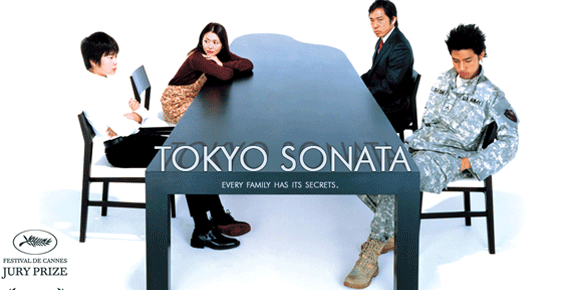
TOKYO SONATA—The Evening Class Interview With Kiyoshi Kurosawa
Many years ago I was taught to dream in detail and that such details involve the discipline of placing one foot patiently in front of the other. Walking to my scheduled appointment with Kiyoshi Kurosawa—whose most recent film Tokyo Sonata screened during this year’s Toronto International Film Festival—I kept watching the tips of my shoes on the sidewalk; the fulfillment of some dreams are just that vivid. If there were only five filmmakers in the world I would ever be allowed to talk to, Kiyoshi Kurosawa would be first among them and I am deeply grateful to Fortissimo Films for arranging the interview and to Linda Hoagland for her translative assistance.
Kiyoshi Kurosawa’s Tokyo Sonata is a portrait of a struggling Japanese family: a father Ryuhei Sasaki (Teruyuki Kagawa), who abruptly loses his job and conceals it from his family; the eldest son Takashi (Yu Koyanagi) who hardly ever returns home from college; the youngest son Kenji (Kai Inowaki) who furtively takes piano lessons without telling his parents; and the mother Megumi (Kyoko Koizumi) who knows deep down that her role is to keep the family together, but cannot find the will to do so. Somehow a single, unforeseeable rift has developed within the family, spreading quickly and quietly, and threatening to break them apart.
At the Greencine Daily, Dave Hudson has gathered together the critical response from both Cannes (where Tokyo Sonata won the Un Certain Regard Jury Prize) and the New York Film Festival. In her Cannes report to Film Comment (July/August 2008, p. 54), Amy Taubin discerns: “The film would seem to be a turning point for Kurosawa; the sustained quiet anxiety that pervades the early scenes and the eruption of hysterical behavior toward the end are grounded in realism with no reference to the paranormal phenomena that have been at the center of his work.” At Senses of Cinema, Markus Keuschnigg writes that Kurosawa’s “somber family tale” exceeds expectations. “Kurosawa’s assured directing makes way for a new family structure that falls into place at the very end of the movie.” As Matt Riviera assesses in his write-up of Tokyo Sonata for the Sydney Film Festival: “Japanese society obeys strict laws and a rigid structure, but in Kurosawa’s dystopia, it takes very little to break the social contract. The eruption of the supernatural—or even the semblance of the supernatural—frees men and women from their responsibilities and renders meaningless the rules that ordinarily keep them in line. While it is devoid of supernatural elements and includes occasional forays into screwball comedy, Tokyo Sonata is not a total departure from Kurosawa’s genre offerings of the past 10 years. In fact, it could be his most frightening film to date. Thematically, it contains many of the motifs present in the director’s horror films: alienation in contemporary Japanese families, the fragility of the social fabric, the incapacity to articulate our fears.”
For the rest of the interview click http://theeveningclass.blogspot.com/2008/12/tokyo-sonata-evening-class-interview.html




